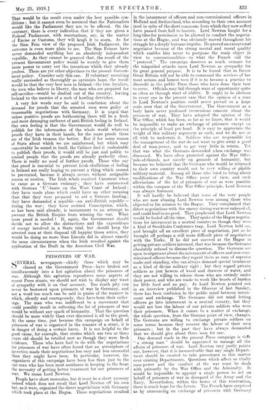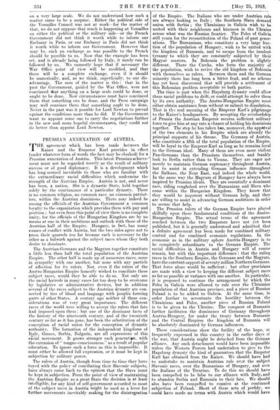PRISONERS 01? WAR.
SEVERAL newspapers—chiefly those which may be classed as the Government Press—have broken out simultaneously into a hot agitation about the prisoners of war. Although this agitation reproduces some aspects of recent Press stunts, we should not wish to display any want of sympathy with it on that account. Too much pity can never be bestowed upon prisoners of war in Germany, and not a word too much can be said in praise of the manner in which, silently and courageously, they have born their suffer- ings. The man who was indifferent to a movement that could possibly result in softening the lot of prisoners of war would be without any spark of humanity. That the question should be more widely than ever discussed is all to the good. 4t the same time, just because this campaign on behalf of prisoners of war is organized in the manner of a stunt, it is in danger of doing a certain harm. It is not helpful to the good cause, for -example, that stories which are two or three years old should be retailed now as though they were fresh evidence. Those who have had to do with the negotiations for prisoners of war have often found that an atmosphere of invective made their negotiations less easy and less successful than they might have been. In particular, however, the organizers of this campaign have been less than just to the one man who has been most assiduous in keeping to the front the necessity of getting better treatment for our prisoners of war. We mean Lord Newton.
People have short memories, but it must be a short memory indeed which does not recall that Lord Newton off his own bat, as it were, organized the direct negotiations with Germany which took place at the Hague. Those negotiations resulted in the internment of officers and non-commissioned officers in Holland and .Switzerland, who according to their own account (and in spite of the short commons from which they now suffer) have passed from hell to heaven. Lord Newton fought for a long time for permission to be allowed to conduct the negotia- tions at the Hague, and was obviously moved throughout his struggle by a deeply humane impulse. He proved an exceptional negotiator because of the strong mental and moral quality which enables him never to postpone the main object in view to conventionalities—to what the French call the " protocol." The campaign deserves as much censure for the misguided attacks upon Lord Newton as sympathy for its great general purpose. It is to be feared that in future Great Britain will not be able to command the services of her most serious and honest men if it is to become a practice to discredit in the public Press those who have done their best to serve. Officials may fail through want of opportunity quite as often as through want of ability. It ought to be obvious to every one in the present case that the opinion of a man in Lord Newton's position could never prevail on a large scale over that of the Government. The Government as a body have never professed tremendous concern about the prisoners of war. They have adopted the opinion of the War Office, which has been, so far as we know, that it would be impossible to make an exchange of prisoners except on the principle of head per head. It is easy to appreciate the weight of this military argument as such, and we do not at all wish to underrate it. Soldiers who are responsible for the management of the war do not want to give away a good deal of man-power, and to get very little in return. Yet that was what the Germans demanded when exchange was discussed. We have often protested against the War Office 'rule-of-thumb, not merely on grounds of humanity, but because we believed that the Germans who would be returned to their own country would not be very willing or pliable military material. Among all those who tried to bring about modifications of the War Office point of view, and such alleviations of the lot of prisoners of war as were possible within the compass of the War Office principle, Lord Newton was always foremost.
It will hardly be believed that some of the very people who are now abusing Lord Newton were among those who objected to his mission to the Hague. They complained that direct negotiations with the enemy during war were unheard of, and could lead to no good. They prophesied that Lord Newton would be fooled all the time. They spoke of the Hague negotia- tions for internment in a neutral country as though they were a kind of Stockholm, Conference trap. Lord Newton held on, and brought off an excellent piece of negotiation, just as he brought off perhaps a still more difficult piece of negotiation with the Turks. If he did not succeed at the Hague in getting private soldiers interned, that was because the Germans absolutely refused to discuss the question. The Germans are open to argument about the internment of officers and non-com- missioned officers because they regard them as men of superior make and standing, who can always demand special treatment as a kind of divine military right ; but they regard private soldiers as just hewers of wood and drawers of water, and they are not willing to release those who are entirely under their power, and who are made to work like beasts of burden for little food and no pay. As Lord Newton pointed out in an interview published in the Observer of last Sunday, there has been confusion in the public mind between intern- ment and exchange. ' The Germans did not mind letting officers go into internment in a neutral country, but they would not lose the labour of our private soldiers who were their prisoners. When it comes to a matter of exchange, the whole question, from the German point of view, changes. The Germans are willing to exchange private soldiers on some terms because they recover the labour of their own prisoners ; but in the past they have always demanded that we should give about three men for one. One demand made in the present Press campaign is thSt " a strong man " should be appointed to manage all the affairs of prisoners of war. Lord Newton very justly points out, however, that it is inconceivable that any single Depart- ment should be created to take precedence in this matter over existing Departments. Questions which affect so vitally man-power and the conduct of the war must be dealt with primarily by the War Office and the Admiralty. It would be impossible to appoint a single person to act on behalf of prisoners of war in disregard of the Army and the Navy. Nevertheless, within the terms of this reservation, there is much hope for the future. The French have surprised us by announcing an exchange of prisoners with Germany on a very large scale. We do not understand how such a matter came to be a surprise. . Either the politicali side of the Versailles Council was .not at work—for the matter of that, we do not suppose that much is happening at Versaillei on either the political or the military. side—or the French Government did not think it worth while to inform our Embassy in Paris, or our Embassy in Paris did not think it worth while to inform our Government. However that may be, such an exchange as was possible. to the French should be possible to Us. Now that the example has been set, and is already being followed by Italy, it surely can be followed by us. We earnestly hope that if necessary the War Office point of view will be modified, and that there will be a complete exchange, even if it should be numerically, and, as we think, superficially, to our dis- advantage. The sum of the matter is this : that in the past the Government, guided by the War Office, were not convinced that anything on a large scale could be done, or ought to be done. Now circumstances must have convinced them that something can be done, and the Press campaign may well convince them that something ought to be done. Never in the past was it possible for Lord Newton to prevail against the conditions more than he did. If the Government want to appoint some one to carry the negotiations further in the new and more hopeful circumstances, they could not do better than appoint Lord Newton. .



























 Previous page
Previous page